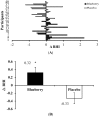Blueberries improve endothelial function, but not blood pressure, in adults with metabolic syndrome: a randomized, double-blind, placebo-controlled clinical trial
- PMID: 26024297
- PMCID: PMC4488775
- DOI: 10.3390/nu7064107
Blueberries improve endothelial function, but not blood pressure, in adults with metabolic syndrome: a randomized, double-blind, placebo-controlled clinical trial
Abstract
Blueberry consumption has been shown to have various health benefits in humans. However, little is known about the effect of blueberry consumption on blood pressure, endothelial function and insulin sensitivity in humans. The present study investigated the role of blueberry consumption on modifying blood pressure in subjects with metabolic syndrome. In addition, endothelial function and insulin sensitivity (secondary measurements) were also assessed. A double-blind and placebo-controlled study was conducted in 44 adults (blueberry, n = 23; and placebo, n = 21). They were randomized to receive a blueberry or placebo smoothie twice daily for six weeks. Twenty-four-hour ambulatory blood pressure, endothelial function and insulin sensitivity were assessed pre- and post-intervention. The blood pressure and insulin sensitivity did not differ between the blueberry and placebo groups. However, the mean change in resting endothelial function, expressed as reactive hyperemia index (RHI), was improved significantly more in the group consuming the blueberries versus the placebo group (p = 0.024). Even after adjusting for confounding factors, i.e., the percent body fat and gender, the blueberry group still had a greater improvement in endothelial function when compared to their counterpart (RHI; 0.32 ± 0.13 versus -0.33 ± 0.14; p = 0.0023). In conclusion, daily dietary consumption of blueberries did not improve blood pressure, but improved (i.e., increased) endothelial function over six weeks in subjects with metabolic syndrome.
Keywords: blueberries; cardiovascular risk factors; endothelial dysfunction; endothelial function; hypertension; prediabetes.
Figures


Similar articles
-
Blueberry anthocyanin intake attenuates the postprandial cardiometabolic effect of an energy-dense food challenge: Results from a double blind, randomized controlled trial in metabolic syndrome participants.Clin Nutr. 2022 Jan;41(1):165-176. doi: 10.1016/j.clnu.2021.11.030. Epub 2021 Nov 27. Clin Nutr. 2022. PMID: 34883305 Free PMC article. Clinical Trial.
-
Blueberry supplementation attenuates oxidative stress within monocytes and modulates immune cell levels in adults with metabolic syndrome: a randomized, double-blind, placebo-controlled trial.Food Funct. 2017 Nov 15;8(11):4118-4128. doi: 10.1039/c7fo00815e. Food Funct. 2017. PMID: 29019365 Clinical Trial.
-
Effects of a quercetin-rich onion skin extract on 24 h ambulatory blood pressure and endothelial function in overweight-to-obese patients with (pre-)hypertension: a randomised double-blinded placebo-controlled cross-over trial.Br J Nutr. 2015 Oct 28;114(8):1263-77. doi: 10.1017/S0007114515002950. Epub 2015 Sep 2. Br J Nutr. 2015. PMID: 26328470 Free PMC article. Clinical Trial.
-
Blueberry intervention improves metabolic syndrome risk factors: systematic review and meta-analysis.Nutr Res. 2021 Jul;91:67-80. doi: 10.1016/j.nutres.2021.04.006. Epub 2021 May 21. Nutr Res. 2021. PMID: 34139510
-
Circulating Anthocyanin Metabolites Mediate Vascular Benefits of Blueberries: Insights From Randomized Controlled Trials, Metabolomics, and Nutrigenomics.J Gerontol A Biol Sci Med Sci. 2019 Jun 18;74(7):967-976. doi: 10.1093/gerona/glz047. J Gerontol A Biol Sci Med Sci. 2019. PMID: 30772905 Review.
Cited by
-
Blueberry Polyphenols Increase Nitric Oxide and Attenuate Angiotensin II-Induced Oxidative Stress and Inflammatory Signaling in Human Aortic Endothelial Cells.Antioxidants (Basel). 2022 Mar 23;11(4):616. doi: 10.3390/antiox11040616. Antioxidants (Basel). 2022. PMID: 35453301 Free PMC article.
-
Postprandial Effects of Blueberry (Vaccinium angustifolium) Consumption on Glucose Metabolism, Gastrointestinal Hormone Response, and Perceived Appetite in Healthy Adults: A Randomized, Placebo-Controlled Crossover Trial.Nutrients. 2019 Jan 19;11(1):202. doi: 10.3390/nu11010202. Nutrients. 2019. PMID: 30669469 Free PMC article. Clinical Trial.
-
Effects of anthocyanin supplementation on blood lipid levels: a systematic review and meta-analysis.Front Nutr. 2023 Aug 15;10:1207751. doi: 10.3389/fnut.2023.1207751. eCollection 2023. Front Nutr. 2023. PMID: 37649528 Free PMC article.
-
Haplotype-phased genome and evolution of phytonutrient pathways of tetraploid blueberry.Gigascience. 2019 Mar 1;8(3):giz012. doi: 10.1093/gigascience/giz012. Gigascience. 2019. PMID: 30715294 Free PMC article.
-
Flavonoid intake from fruit and vegetables during adolescence is prospectively associated with a favourable risk factor profile for type 2 diabetes in early adulthood.Eur J Nutr. 2019 Apr;58(3):1159-1172. doi: 10.1007/s00394-018-1631-3. Epub 2018 Feb 21. Eur J Nutr. 2019. PMID: 29468461
References
-
- Alberti K.G., Zimmet P.Z. Definition, diagnosis and classification of diabetes mellitus and its complications. Part 1: Diagnosis and classification of diabetes mellitus provisional report of a who consultation. Diabet. Med. 1998;15:539–553. - PubMed
Publication types
MeSH terms
Substances
Grants and funding
LinkOut - more resources
Full Text Sources
Other Literature Sources
Medical

